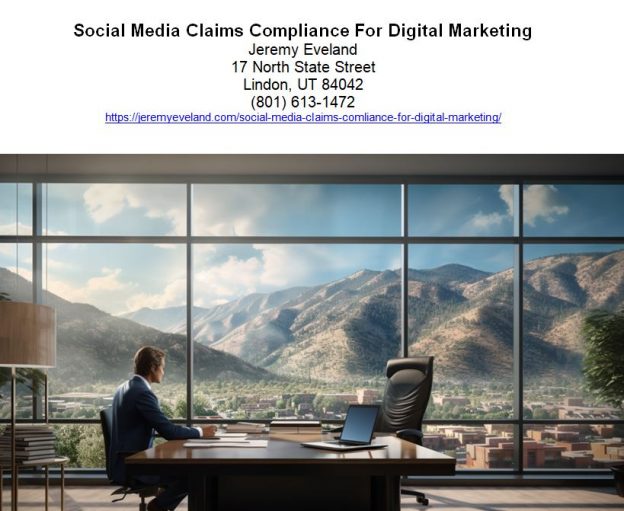In the fast-paced world of digital marketing, social media has become an indispensable tool for businesses looking to expand their reach and engage with their target audience. However, with the rise of social media advertising, companies must also navigate the complex landscape of claims compliance to avoid legal pitfalls and protect their brand reputation. This article explores the importance of social media claims compliance for digital marketing and provides essential insights to help businesses effectively navigate this intricate terrain. By adhering to best practices and understanding the legal implications, companies can leverage the power of social media marketing while ensuring their messaging remains accurate, reliable, and compliant with legal standards.
Understanding Social Media Claims Compliance
Social media claims compliance refers to the adherence to regulations and guidelines set forth by various governing bodies to ensure that the claims made on social media platforms are accurate, substantiated, and transparent. With the rise of social media as a prominent marketing tool, businesses and marketers need to understand and comply with these regulations to avoid legal consequences and maintain the trust and confidence of their audience.
What is Social Media Claims Compliance?
Social media claims compliance involves following specific rules and guidelines when making claims or assertions on social media platforms for marketing purposes. This includes ensuring that the claims made are truthful, substantiated with evidence, and comply with industry-specific regulations and advertising standards. Compliance is crucial because false or misleading claims can harm consumers, damage a business’s reputation, and lead to legal implications and penalties.

Importance of Social Media Claims Compliance
Compliance with social media claims is essential for several reasons. Firstly, adhering to regulations and guidelines fosters consumer trust and confidence in a brand or business. Clear and accurate claims help consumers make informed decisions, purchasing products or services that align with their needs or preferences. Compliance also ensures fair competition in the marketplace by preventing deceptive advertising practices that give certain businesses an unfair advantage over others.
Furthermore, compliance helps businesses mitigate legal risks and avoid potential lawsuits or fines. Regulatory bodies closely monitor social media platforms, and non-compliance can result in legal consequences. By proactively following the guidelines, businesses can safeguard their reputation, maintain customer loyalty, and foster long-term success in the digital marketing landscape.
Legal implications of non-compliance
Non-compliance with social media claims can have serious legal implications for businesses. Regulatory bodies, such as the Federal Trade Commission (FTC) in the United States, have strict guidelines regarding advertising and marketing practices. Violating these regulations can result in hefty fines, penalties, and potential lawsuits.
In addition to the financial consequences, non-compliance can damage a business’s reputation. Negative publicity and consumer backlash due to misleading claims can lead to a loss of trust and credibility in the market. Rebuilding trust after non-compliance can be a challenging and time-consuming process, potentially affecting a business’s bottom line.
Therefore, understanding and adhering to social media claims compliance is crucial to avoid legal pitfalls, protect the business’s reputation, and maintain consumer trust.
Factors Affecting Social Media Claims Compliance
Several factors influence social media claims compliance, including regulations and guidelines, industry-specific rules, and advertising standards set by self-regulatory organizations.
Regulations and Guidelines
Regulatory bodies, such as the FTC in the United States and Advertising Standards Authority (ASA) in the United Kingdom, have established regulations and guidelines that govern advertising and marketing practices. These regulations ensure that businesses do not engage in deceptive or misleading practices, protecting consumer interests and promoting fair competition. Businesses must familiarize themselves with these regulations and ensure that their social media claims comply with the guidelines set forth.
Industry-specific rules
Different industries may have additional rules and regulations specific to their sector. For example, pharmaceutical companies need to comply with the guidelines set by regulatory bodies like the Food and Drug Administration (FDA). These rules ensure that health-related claims made on social media are accurate, supported by scientific evidence, and do not mislead consumers.
Advertising Standards and Self-regulatory Organizations
Self-regulatory organizations (SROs) play a significant role in promoting ethical advertising practices and maintaining industry standards. These organizations, such as the National Advertising Division (NAD) in the United States, provide guidance and monitor compliance within specific industries.
Businesses should be aware of the advertising standards set by these organizations and ensure that their social media claims meet the required criteria established by the industry.
Best Practices for Social Media Claims Compliance
To ensure compliance with social media claims, businesses should follow best practices that promote transparency, accuracy, and substantiation of claims. These practices include a thorough review and approval process, making clear and substantiated claims, and disclosing any material connections.
Review and Approval Process
Implementing a comprehensive review and approval process is crucial to maintain compliance with social media claims. This process involves carefully examining the content before it is posted on social media platforms to ensure its accuracy and compliance with regulations. Businesses should establish clear protocols and designate a responsible individual or team to review and approve marketing claims.
Clear and Substantiated Claims
Businesses must make claims on social media that are clear, accurate, and supported by evidence. Claims should be truthful and not mislead consumers. Supporting evidence, such as scientific studies or customer testimonials, should be readily available to substantiate the claims made. Clear and substantiated claims help build trust with consumers and reduce the risk of non-compliance.
Disclosure of Material Connections
Businesses that collaborate with influencers or have material connections should disclose these relationships to maintain transparency. Disclosure guidelines vary by jurisdiction but generally require clear and conspicuous disclosure of sponsorship or paid partnerships. This helps consumers identify potential biases and make informed decisions.

Ensuring Compliance on Different Social Media Platforms
Each social media platform has its own set of guidelines and practices, and businesses must adapt their social media claims compliance accordingly. Here are some considerations for popular social media platforms:
Facebook has specific guidelines regarding advertising content, including restrictions on false claims, prohibited content, and ad transparency. Advertisers should familiarize themselves with Facebook’s policies to ensure their claims comply with the platform’s guidelines.
Twitter also has policies regarding misleading claims and prohibited content. Advertisers must ensure that their tweets adhere to these guidelines, avoiding misleading or false information.
Instagram requires disclosure of material relationships and sponsored content. Influencer marketing is prevalent on this platform, and businesses must ensure that influencer partnerships are clearly disclosed to comply with Instagram’s guidelines.
While LinkedIn is primarily a professional networking platform, it also has advertising features. Businesses advertising on LinkedIn should adhere to its policies regarding accurate and substantiated claims to maintain compliance.
Dealing with Influencer Marketing
Influencer marketing has become a popular strategy on social media, but it also brings unique compliance challenges. Businesses must navigate the following aspects to ensure compliance:
Identifying Influencer Relationships
First and foremost, businesses should clearly identify their relationship with influencers. This includes disclosing any financial arrangements or sponsorships between the business and the influencer. Maintaining transparency about these relationships helps consumers make informed decisions based on trust.
Educating and Monitoring Influencers
Businesses must educate influencers about compliance guidelines and provide clear instructions on the types of claims they can make. Regular monitoring of influencer content is necessary to ensure that claims comply with regulations and guidelines.
Creating Clear Disclosure Guidelines
Businesses should establish clear disclosure guidelines for influencers, specifying the language, format, and placement of disclosure statements. These guidelines should comply with the requirements of relevant regulatory bodies and social media platforms.

Monitoring and Enforcement of Compliance
Monitoring and enforcing compliance with social media claims is crucial to maintain adherence to regulations and protect a business’s reputation. Here are some effective strategies:
Regular Audits and Reviews
Businesses should conduct regular audits and reviews of their social media marketing efforts to identify any non-compliance issues. These audits help in assessing the effectiveness of internal compliance processes and making necessary improvements.
Reporting Violations
If a business becomes aware of any non-compliance, it should report the violation to the appropriate regulatory bodies or self-regulatory organizations promptly. Reporting violations demonstrates a commitment to ethical advertising practices and may mitigate potential penalties.
Handling Customer Complaints
Addressing customer complaints related to social media claims promptly and transparently is essential. Businesses should have a process in place to investigate complaints, rectify any inaccuracies, and maintain open communication with the affected customers.
Case Studies: Social Media Claims Compliance
Examining case studies can provide valuable insights into the importance of social media claims compliance. Here are two examples:
Case Study 1: XYZ Company’s Compliance Failure
XYZ Company faced a compliance failure when they made false claims about their product’s effectiveness without proper substantiation. The company received multiple customer complaints and faced significant legal consequences, including hefty fines and loss of customer trust. This compliance failure resulted in long-term damage to their reputation and a decline in sales.
Case Study 2: ABC Company’s Success Story
ABC Company ensured compliance by conducting regular audits and reviews of their social media claims. They maintained a strong review and approval process and made clear, substantiated claims. As a result, ABC Company gained consumer trust, improved brand reputation, and experienced significant growth in their online marketing efforts.
Working with Legal Professionals
Given the complexity and potential legal implications of social media claims compliance, businesses should consider working with legal professionals to navigate this landscape effectively.
Role of Attorneys in Compliance
Attorneys specializing in advertising law and compliance can provide businesses with invaluable guidance throughout the process. They help interpret regulations, review marketing claims, and ensure that businesses are compliant with applicable laws and industry-specific guidelines.
Benefits of Legal Consultation
Consulting with a legal professional offers businesses several benefits. Attorneys can help identify potential risks, develop compliant marketing strategies, review contracts, and provide advice on navigating legal challenges. Legal consultation can save businesses time, money, and potential reputational damage in the long run.
Choosing the Right Lawyer
When selecting a lawyer to assist with social media claims compliance, businesses should consider their expertise in advertising law, their track record of successful compliance cases, and their understanding of the industry in which the business operates. It is essential to choose a lawyer who can effectively guide the business through its unique compliance needs.
Frequently Asked Questions (FAQs)
What are the consequences of non-compliance?
Non-compliance with social media claims can result in legal consequences, such as fines, penalties, and potential lawsuits. It can also damage a business’s reputation and lead to a loss of consumer trust.
How can I ensure my social media claims are compliant?
To ensure compliance, businesses should familiarize themselves with relevant regulations, guidelines, and industry-specific rules. Implementing a thorough review and approval process, making clear and substantiated claims, and disclosing material connections are crucial steps for compliance.
What should be included in a disclosure statement?
Disclosure statements should clearly and conspicuously disclose any material relationships, sponsorships, or financial arrangements between the business and influencers. The statements should comply with relevant regulations and guidelines, providing transparency to consumers.
Areas We Serve
We serve individuals and businesses in the following locations:
Salt Lake City Utah
West Valley City Utah
Provo Utah
West Jordan Utah
Orem Utah
Sandy Utah
Ogden Utah
St. George Utah
Layton Utah
South Jordan Utah
Lehi Utah
Millcreek Utah
Taylorsville Utah
Logan Utah
Murray Utah
Draper Utah
Bountiful Utah
Riverton Utah
Herriman Utah
Spanish Fork Utah
Roy Utah
Pleasant Grove Utah
Kearns Utah
Tooele Utah
Cottonwood Heights Utah
Midvale Utah
Springville Utah
Eagle Mountain Utah
Cedar City Utah
Kaysville Utah
Clearfield Utah
Holladay Utah
American Fork Utah
Syracuse Utah
Saratoga Springs Utah
Magna Utah
Washington Utah
South Salt Lake Utah
Farmington Utah
Clinton Utah
North Salt Lake Utah
Payson Utah
North Ogden Utah
Brigham City Utah
Highland Utah
Centerville Utah
Hurricane Utah
South Ogden Utah
Heber Utah
West Haven Utah
Bluffdale Utah
Santaquin Utah
Smithfield Utah
Woods Cross Utah
Grantsville Utah
Lindon Utah
North Logan Utah
West Point Utah
Vernal Utah
Alpine Utah
Cedar Hills Utah
Pleasant View Utah
Mapleton Utah
Stansbury Par Utah
Washington Terrace Utah
Riverdale Utah
Hooper Utah
Tremonton Utah
Ivins Utah
Park City Utah
Price Utah
Hyrum Utah
Summit Park Utah
Salem Utah
Richfield Utah
Santa Clara Utah
Providence Utah
South Weber Utah
Vineyard Utah
Ephraim Utah
Roosevelt Utah
Farr West Utah
Plain City Utah
Nibley Utah
Enoch Utah
Harrisville Utah
Snyderville Utah
Fruit Heights Utah
Nephi Utah
White City Utah
West Bountiful Utah
Sunset Utah
Moab Utah
Midway Utah
Perry Utah
Kanab Utah
Hyde Park Utah
Silver Summit Utah
La Verkin Utah
Morgan Utah
Business Lawyer Consultation
When you need help from a Social Media Compliance Attorney in Utah, call Jeremy D. Eveland, MBA, JD (801) 613-1472 for a consultation.
Jeremy Eveland
17 North State Street
Lindon UT 84042
(801) 613-1472
Related Posts
What Are The 4 Different Types of Business Law?
Business Lawyer Washington Utah
Business Lawyer South Salt Lake Utah
Legal Requirements for Utah Technology Startups
Business Lawyer Farmington Utah
Due Diligence For Buying A Utah Business
Understanding Utah’s Labor Laws
Business Lawyer North Salt Lake Utah
Product Liability Laws in Utah
Preventing Cybersecurity Breaches
Business Lawyer North Ogden Utah
Business Lawyer Brigham City Utah
Mastering Business Law: Key Essentials For Success
Business Lawyer Centerville Utah
Shareholder Agreements in Utah
Business Lawyer Hurricane Utah
Corporate Attorney West Jordan UT
Estate Planning For Survivorship Considerations
Construction Lawyer West Bountiful Utah
Construction Lawyer Snyderville Utah
Estate Planning For Protecting Family Privacy
